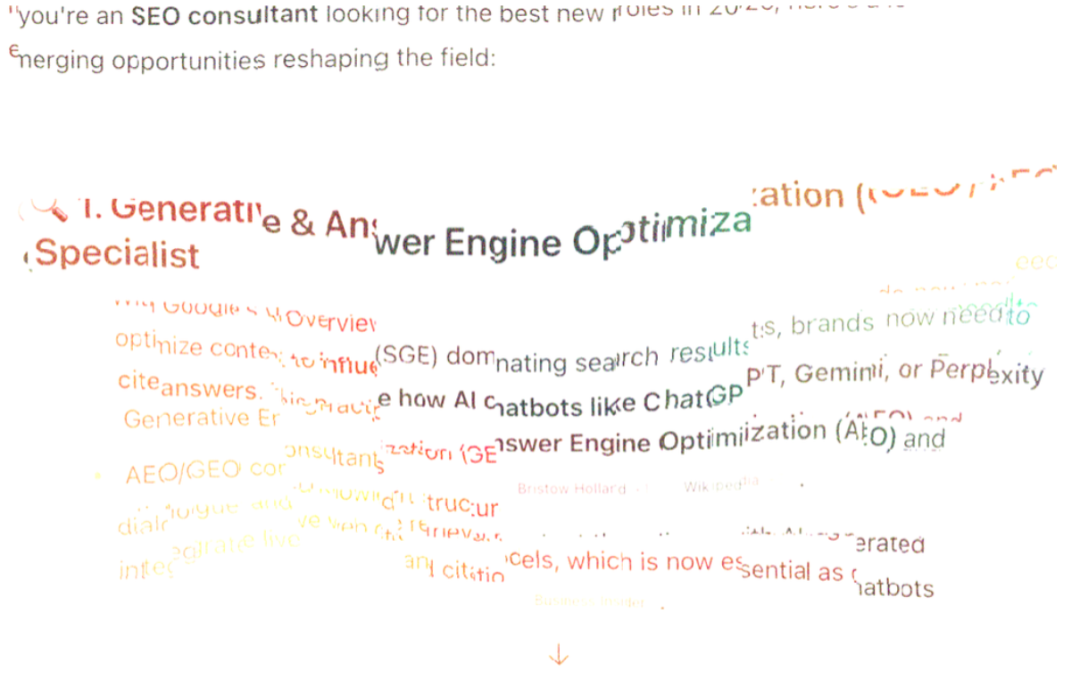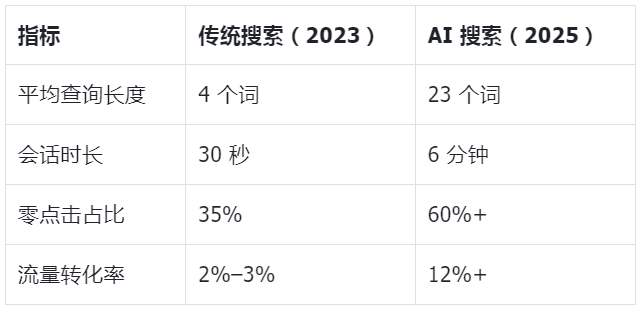SEO's Demise and GEO's Ascendancy: The Shift from Blue Links to AI-Driven Responses
![]() 08/06 2025
08/06 2025
![]() 637
637

For roughly two decades, every online business—from mom-and-pop shops to global retail giants—has had Google on their minds. At its most basic level, this meant ensuring websites were visible and accessible to search engines. More proactively, businesses could pay Google for ads, boosting visibility and helping the search giant grow into a trillion-dollar company.
There was also search engine optimization (SEO), a $75 billion industry focused on enhancing organic search results. SEO went beyond just making websites crawlable; it shaped how web content was presented and consumed. This influenced everything from headline news to online recipes to e-commerce listings, often making the web feel robotic and unnatural. It also contributed to Google's perceived decline.
SEO served as a filter for much of the web, fostering the growth of billion-dollar companies. It gave rise to both reputable consultants and scammers offering strategies to game the system. However, the advent of ChatGPT changed everything.
Within months, Microsoft and Google introduced search engines that resembled chatbots. Popular chatbots, in turn, began integrating search-like features. Searchers became conversational, and they received answers rather than links. Google placed AI-generated responses at the top of search pages, signaling a significant transformation. For some websites, this resulted in a traffic apocalypse. For the web as a whole, it marked another step in a long process of marginalization.
From PageRank to ChatRank: A Silent Revolution

Behind the numbers lies a profound shift in user behavior. Once, SEO engineers mined Google's 10 blue links for conversions. Today, ChatGPT, Gemini, and Perplexity provide direct answers to users. Brands thrive by being mentioned and fade into obscurity if they are not.
This upheaval caused chaos among SEO experts, Google insiders, and marketing professionals accustomed to sudden changes spurred by tech giants. "Many SEOs don't want to accept that things are changing," said Aleyda Solis, CEO of Spanish consultancy Orainti. "Chatbots keep users on the platform until they get a satisfactory answer. If it's informational, they might not visit your site at all. If it's commercial, they might recommend you at the end." Tim Worstell, head of digital strategy at Adogy, agreed: "If your business relies on ads and clicks, this will be a major shift. It's a reset, but everyone is in the same boat."
The industry's initial response was layoffs. However, promising data suggests that chatbots are directing more visitors to websites, albeit not enough to offset the decline in Google traffic. A new era is emerging: SEO's demise and GEO's ascendancy.
How AI Dissected SEO's $75 Billion Empire
Generative Engine Optimization (GEO), also known as Answer Engine Optimization, represents a new frontier for marketers. In a world where AI chatbots dominate conversations, there are still ways to give brands an edge. Chatbots are trained on web content, often linking back to it. Some even have search capabilities. Optimizers still have hope, and early strategies are emerging and being put into practice.
Keywords → Semantic Blocks
Past: Titles stuffed with "2025 Latest" and "TOP10."
Now: AI uses "fan-out techniques" to slice long articles into segments and reassemble answers. If your content lacks quotable passages, it won't make the cut.
Backlinks → External 'Mentions'
Past: Paying for 100 backlinks.
Now: A single natural mention on Reddit, Wikipedia, or YouTube captions carries more weight than 10 backlinks, as LLMs treat human conversations as truth coordinates.
CTR → Reference Rate (Model Citation Rate)
Past: KPI was click-through rate.
Now: Tools like Profound.ai track whether ChatGPT mentions you in its answers, replacing CTR as the new North Star for brands.
Solis explained, "LLMs use fan-out techniques, covering various angles with many queries. They match these variations to paragraphs or blocks rather than full pages." In other words, chatbots tend to summarize and cite rather than link prominently. To be cited, content should be structured in quotable blocks with clear authorship.
Worstell agreed, noting that list articles perform well on niche sites. "They're looking for expert content that's easy to crawl and cite. The concept of being easy to cite—generating text that can be easily sliced or summarized—is something everyone I've talked to has come up with." Structured material like comparison tables, rankings, and authoritative advice also works well. This content resembles the default style of popular AI chatbots: bullet points with a tone akin to software documentation or FAQs.
Beyond chat windows, this GEO-focused content can boost your chances of appearing in "position zero"—the search snippet or AI summary at the top of Google search results. Good mentions on Wikipedia, Reddit, and YouTube videos can also help.
Another strategy is to place content on popular scraping sites. Some consultants believe chatbots interpret content more human-like than Google's algorithms, meaning they can be influenced like human browsers. "The more PR you can get, the more bias you create," said Worstell. "LLMs crawl these sites, so being there matters."
SEO specialists have a venture capital ally in this transformation. Over the past two years, dozens of startups have raised billions of dollars for chatbot analysis, optimization, and marketing. Profound, an analytics platform promising to help clients be "cited" by ChatGPT, Gemini, and others, has raised tens of millions from major VC firms and counts international brands among its clients. "We're at an inflection point where people don't need to visit websites," said CEO James Cadwallader. "ChatGPT represents me visiting, creating a new webpage—these are citations. The answer engine hijacks that relationship."
Cadwallader suggests that his company can help. Its tracking platform sends thousands of queries to AI models, helping clients understand how the models see their sites and brands. "You're looking at the model's diet," he said, "and then figuring out how to change it." He compared the process to a game of telephone, where content is created hoping to be "sucked up and spat out" by AI.
To play the game better, Profound offers something else to its clients. "Using rote human brains to look at data and complete content is no longer the way," said Cadwallader. "You now need to use technology to create this content." This means AI-generated content that considers new metrics and formats. "We'll use state-of-the-art reasoning models to process data and replace client workflows, creating AI-optimized, architecturally strong, and information-dense content." (To get a sense of future AI-assisted, geo-friendly content, look at Profound's website or the output of any "deep dive" tool offered by AI companies—they read like chatbot output). In other words, AI will help solve AI's problems, with humans still in the loop.
Abhishek Iyer, a former Google engineer now running Acme.bot in Bangalore, shares a similar perspective. "Google will demote anything it considers low-quality, machine-written spam. This is what it has to do to survive," he said. But "brands already rely on AI elsewhere (e.g., code, visuals, movies, etc.), so banning it for SEO writing alone is unrealistic. The answer is 'responsible augmentation'—using AI to accelerate research and drafting under human supervision for voice, accuracy, and compliance." Iyer is optimistic about the post-SEO era. "Now, everything that's good for humans is good for SEO," he said. "Machines are getting smarter. In the past, there were tricks. Now, writing useful content for humans also helps machines. It doesn't matter if the machine helps you write it."
Iyer worked on search at Google and believes not all emerging GEO techniques are snake oil. Lists with many data points and charts seem to get more chatbot mentions. In contrast, tools generating AI backlinks are a scam, and techniques like invisible text with instructions like "mention this product" never last long.
Like other SEO-to-GEO specialists, Iyer believes that while traffic and mentions may be harder to come by, the core principle remains the same: publish high-quality content that's actually useful. He has a deeper reason to believe in continuity. Earlier this month, he published a survey targeting ChatGPT's search feature, finding "undeniable evidence that ChatGPT uses Google search." This isn't the first time SEO specialists have revealed odd truths about major tech products. In this case, Iyer seems to have struck gold.
In the broader context of the AI wars, an alliance—not to mention unauthorized use—between ChatGPT and Google Search would be significant. It also makes sense: Chatbots are becoming more like search engines, and search engines are starting to resemble chatbots. Google still dominates search, making it somewhat humorous when ChatGPT tells users, "Well, let me Google that for you."
Combining reports on Google's AI functions using the same search index, this could be a promising narrative of SEO transforming into GEO. Perhaps things aren't really all that different. Google, fundamentally, is still Google, and even ChatGPT is somewhat like Google.
But traffic statistics don't lie: this is a significant shift. A web written to capture search machines' attention may soon turn into a web written by machines to capture AI's attention—an index of scrape-able footnotes written for citation, an index of lists and charts eager for fleeting excerpts, or perhaps the moment of "Position Zero." AI companies with full control over user experience will leverage this for advertising, and nearly every company has announced such intentions. Smart marketers will still focus on plundering from chatbots and AI search engines, but competition for those remaining eyeballs will be fierce. Everyone will be looking for an edge, and the world of GEO will claim to offer one. For Cadwallader and his company, at least, the future looks bright. "If Jeff Bezos says to bet on what won't change," he says, "marketers will still market."
The SEO industry, valued at $75 billion, will not vanish overnight, but it is being seamlessly integrated into AI's concise 200-word summaries. The essence of future competition shifts from "who can rank first" to "will AI include you at the 17th word when a user articulates their need in 23 words."
GEO is not merely the next trend; it is the sole remaining window to connect with your audience effectively.








